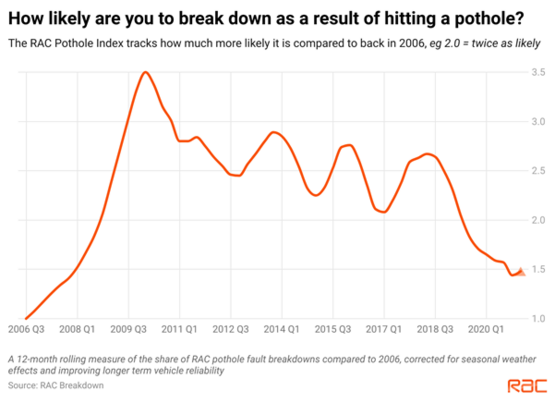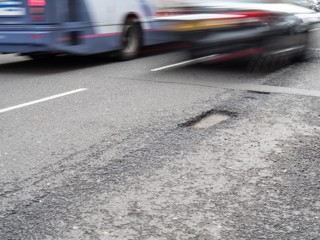There were the equivalent of 52 pothole-related breakdowns a day between January and March 2021, new data from the RAC suggests.
Despite the lockdown, RAC patrols assisted 4,694 drivers who had most likely broken down as a result of hitting a pothole in the first three months of 2021.
The breakdown and recovery company says that is a three-fold increase on the number of pothole-related breakdowns from the last quarter of 2020 (up 3,233 from 1,461 in Q4 2020) and is the largest rise between quarters the RAC has ever seen.
In total, 2.4% of all call-outs attended by RAC patrols between January and March were for broken suspension springs, distorted wheels and damaged shock absorbers – the classic symptoms of a driver having hit a pothole – up from 1.6% during the same period in 2020, and the highest proportion seen since 2017.
When comparing the first quarter of 2021 with the same period of 2020, there were 37% more pothole-related breakdowns.
RAC head of roads policy Nicholas Lyes said: “The condition of many roads is now in a desperate state.
“Put simply, we’ve just had the largest quarterly rise in the number of pothole-related breakdowns on record. And the problem risks getting even worse as pandemic restrictions are eased and the roads get busier.”
Kwik Fit’s annual Pothole Impact Tracker (PIT) report, which was published in March, showed that the total repair bill to vehicles from pothole damage over the past year rose slightly, from £1.249bn to £1.267bn.
The report tracks the impact of potholes on an annual basis and its research suggested that this year, despite reduced mileage, drivers have hit an average of 11 potholes per month, and some 10.2 million have suffered damage to their car as a result.
Government roads funding
The Department for Transport (DfT) allocated £500 million to local authorities in England for highways maintenance in February.
With the average pothole costing around £50 to fill in, the DfT said that the funding could fix the equivalent of 10 million potholes across the country.
It was the second instalment from the £2.5 billion Potholes Fund, providing £500m a year between 2020/21 and 2024/25, announced by the Chancellor in the 2020 Budget – and is part of wider funding the DfT provides for road maintenance, totalling over £1.1bn across England in 2021/22.
However, despite promises of more money from Government, the RAC believes many councils remain stuck in a vicious cycle, unable to properly repair the roads they are responsible for.
Lyes said: “Many drivers are finding themselves having to use roads that in places better resemble the surface of the Moon and, as our figures show, thousands are suffering from unnecessary and, no doubt, costly breakdowns caused by potholes.
“In some ways, the quieter roads brought about by national lockdowns could have been an ideal time for councils to start to fix problem road surfaces ready for the arrival of more traffic as restrictions are eased.
“Sadly, our data suggests this may not have been the case and may also suggest many councils are still simply patching up potholes rather than fixing them properly.”
Road conditions ‘getting worse’
The RAC Pothole Index, a long-term measure of the condition of roads which is adjusted for weather and seasonal effects, increased in the first quarter of 2021 for the first time since early 2018 and now stands at 1.48, up from 1.44 as of the end of December 2020.
This suggests that road quality is now in a declining state and means drivers are nearly one-and-a-half times more likely to breakdown as a result of hitting potholes today than they were when the RAC first started collecting data back in 2006.
Lyes said: “What is undeniably clear is that all road users, whether on two-wheels or four, are paying the price for a lack of long-term maintenance for roads they use regularly.
“Pots of funding announced annually may help fill some potholes, but they don’t cure the problem over the long-term by dealing with underlying major surface defects. Nor do they allow local authorities to plan routine maintenance.”
The RAC has long campaigned for Government to ring-fence some funds over a five-year period to give councils the resources they need to plan and deliver longer-term road maintenance.
“We appeal to the transport secretary and the Treasury to take a fresh look at roads funding given the data we are publishing today,” said Lyes.
“Potholes are a sign of broken roads, but they are also a sign of the broken nature of how the roads are looked after and paid for.
“The UK Government and local authorities must break the cycle and commit to doing something differently – if they don’t, all road users will continue to suffer unnecessarily.”
























Login to comment
Comments
No comments have been made yet.